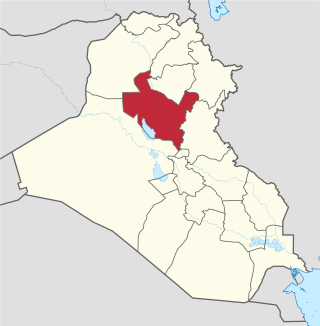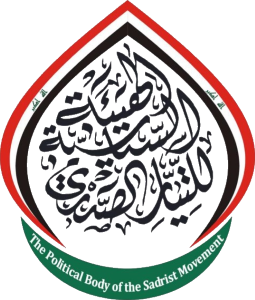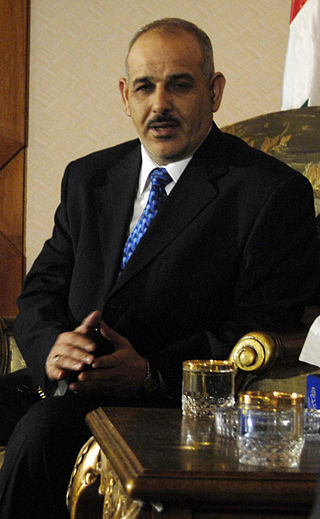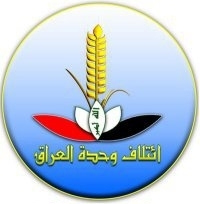Related Research Articles
Iraq is a federal parliamentary representative democratic republic. It is a multi-party system whereby the executive power is exercised by the Prime Minister of the Council of Ministers as the head of government, the President of Iraq as the head of state, and legislative power is vested in the Council of Representatives.

The Saladin, Salah ad Din or Salah Al-Din Governorate is one of Iraq's 19 governorates, north of Baghdad. It has an area of 24,363 square kilometres (9,407 sq mi), with an estimated population of 1,042,200 people in 2003. It is made up of 8 districts, with the capital being Tikrit. Before 1976 the governorate was part of Baghdad Governorate.

The Council of Representatives, usually referred to simply as the Parliament, is the unicameral legislature of the Republic of Iraq. According to the Constitution of Iraq, it is the lower house of the bicameral legislature of the country. As of 2020, it comprises 329 seats and meets in Baghdad inside the Green Zone.
The first government of Iraq led by Prime Minister Nouri al-Maliki took office on May 20, 2006 following approval by the members of the Iraqi National Assembly. This followed the general election in December 2005. The government succeeded the Iraqi Transitional Government which had continued in office in a caretaker capacity until the new government was formed and confirmed.

The Sadrist Movement is an Iraqi Shi'a Islamic national movement and political party, led by Muqtada al-Sadr.

Jawad al-Bulani served as the Interior Minister of Iraq within the Council of Ministers under Iraqi Prime Minister Nouri al-Maliki from 8 June 2006 to 21 December 2010. Bulani is a Shi'a independent member of the United Iraqi Alliance.

Sheik Ahmed Bezaa Abu Risha is a Sunni leader in the Al-Anbar province, and led the movement of Sunni tribesmen known as the Anbar Salvation Council.

Governorate or provincial elections were held in Iraq on 31 January 2009, to replace the local councils in fourteen of the eighteen governorates of Iraq that were elected in the 2005 Iraqi governorate elections. 14,431 candidates, including 3,912 women, contested 440 seats. The candidates came from over 400 parties, 75% of which were newly formed.

Parliamentary elections were held in Iraq on 7 March 2010. The elections decided the 325 members of the Council of Representatives who would elect the prime minister and president. The elections resulted in a partial victory for the Iraqi National Movement, led by former Interim Prime Minister Ayad Allawi, which won 91 seats, making it the largest alliance in the Council. The State of Law Coalition, led by incumbent Prime Minister Nouri Al-Maliki, was the second largest grouping with 89 seats.
The Iraqi Scholars and Intellectuals Group is an Iraqi political coalition formed in 2007. It is predominantly formed from the minority Sunni sect and calls for "employing a moderate religious approach to reinforce national unity". In the 2009 Iraqi governorate elections they took 6% of the vote and 3 seats in Salah ad Din, 3.2% but no seats in Anbar and 1.3% but no seats in Diyala. In March 2009 one of its leaders was assassinated in Basrah.

National Movement for Development and Reform, more commonly known as Al-Hal or the Solution, is a political party in Iraq. The party is a Sunni-based party.
The Coalition for Iraqi National Unity (CINU) is a political party in Iraq. It is led by Nehru Mohammed Abdul Karim al-Kasanzani.

The Unity Alliance of Iraq commonly known as Iraq's Unity, Iraqi Unity or Wassat is an Iraqi political coalition formed to contest the 2010 Iraqi parliamentary election. The coalition was formed by Sheikh Ahmed Abu Risha, the head of the Awakening movement, a Sunni tribal militia which was successful in significantly reducing the insurgency in al-Anbar Governorate and was then reformed into a political party, the Iraq Awakening and Independents National Alliance, which won the most seats in the 2009 Al Anbar governorate election. The Awakening Alliance joined forces with Iraq's Shi'a interior minister Jawad al-Bolani and his secular Iraqi Constitutional Party and Ahmed Abdul Ghafour al-Samarrai, chief of Sunni Endowment Office. The list is led by Jawad al-Bolani.

The disputed territories of northern Iraq are regions defined by article 140 of the Constitution of Iraq as being Arabised during Baath Party rule in Iraq. Most of these regions are inhabited by non-Arabs, including Kurds, Assyrians, Yazidis, Turkmens/Turkomans, and Shabaks.

The 2013 Nineveh Governorate election in Iraq was held on 20 June with elections for the Al Anbar Governorate. Due to security problems, turnout was less than half that of the 2009 election. This election saw Sunni Arab parties lose a number of seats to minority parties.

The Uniters for Reform Coalition is a Sunni political coalition in Iraq.
The Al-Arabiya Coalition also known as Arabic Coalition is an Iraqi political coalition formed for the 2014 Iraqi parliamentary election by then-Deputy Prime Minister of Iraq Saleh al-Mutlaq and others parties and independent politicians.

Citizen Alliance was a political coalition in Iraq led by Ammar al-Hakim, President of the Islamic Supreme Council of Iraq, from 2014 to 2017. Most of its MPs joined the National Wisdom Movement when this new party was launched in 2017 by Ammar al-Hakim.

Ahmed Abdullah Abid Khalaf al-Jubouri is an Iraqi politician from Salah ad-Din governorate, and a prominent figure in the Baiji area. He was the Minister of State for Provincial Affairs from 2014 to 2015 and the governor of Salah ad-Din governorate from 2013 to 2014.

Governorate or provincial elections were scheduled to be held in Iraq on 20 April 2020, to replace the provincial councils in the governorates of Iraq that were elected in the 2013 Iraqi governorate elections and, in Kurdistan Region, in the 2014 elections. The elections were delayed indefinitely in November 2019, amidst demonstrations demanding the end of the existing political system.
References
- ↑ Iraqi Ministry Adopts Political Neutrality. New York Times.October 30, 2008.
- ↑ "Iraqi provincial election results". Boston.com.
- ↑ "Aswat al Iraq". Archived from the original on 2011-07-21. Retrieved 2010-02-09.
- ↑ Abbas, Mohammed (24 August 2009). "ANALYSIS-Trouble in former Qaeda heartland bodes ill for Iraq". Reuters.